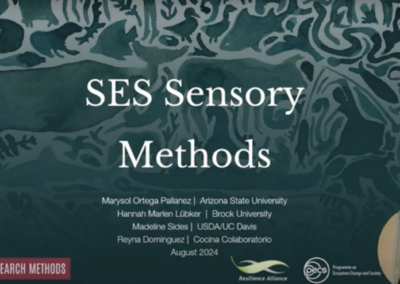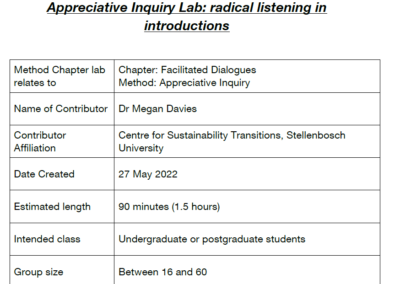This page deals with facilitated dialogue methods, including a suite of facilitated processes that seek to generate social-ecological innovations aimed at challenging and changing existing roles and routines, power dynamics, relations among groups and networks, resource flows, as well as meaning and values (and culture) across different contexts and scales. The content on this page discusses appreciative enquiry, change labs, social innovation labs, the circle, Theory U, T-Labs, scenarios, world cafés, learning journeys, listening projects and dialogue interviewing.
The Chapter summary video gives a brief introduction and summary of this group of methods, what SES problems/questions they are useful for, and key resources needed to conduct the methods. The methods video/s introduce specific methods, including their origin and broad purpose, what SES problems/questions the specific method is useful for, examples of the method in use and key resources needed. The Case Studies demonstrate the method in action in more detail, including an introduction to the context and issue, how the method was used, the outcomes of the process and the challenges of implementing the method. The labs/activities give an example of a teaching activity relating to this group of methods, including the objectives of the activity, resources needed, steps to follow and outcomes/evaluation options.
More details can be found in Chapter 9 of the Routledge Handbook of Research Methods for Social-Ecological Systems.
Chapter summary:
Drimie, S. & Magner, C. (2022)
Method Summaries
Case Studies
Lab teaching/ activity
Tips and Tricks
- Bojer, M.M., H. Roehl, M. Knuth, and C. Magner. 2008. Essential Tools for Social Change. Chagrin Falls: Taos Institute Publications.
- Fuller Transformation Collaborative. 2019. The Art of Systems Change: Eight Guiding Principles for a Green and Fair Future, edited by B. Banerjee, K. Claborn, L. Gaskell, L. Glew, J. Griffin, P. Hovmand, S.L. Mahajan et al. Washington: World Wide Fund for Nature.
- Kahane, A. 2017. Collaborating with the Enemy: How to Work with People You Don’t Agree with or Like or Trust. Oakland: Berrett-Koehler Publishers.
- Schwartz, T. 2018. ‘What it Takes to Think Deeply About Complex Problems.’ Harvard Business Review 9 May. https://hbr.org/2018/05/what-it-takes-to-think-deeply-about-complex-problems.
- Westley, F., S. Laban, C. Rose, K. Robinson, K. McGowan, O. Tjörnbo, and M. Tovey. 2015. Social Innovation Lab Guide. Waterloo: University of Waterloo


